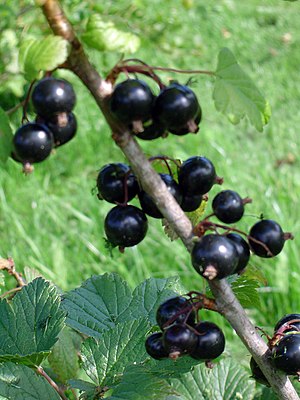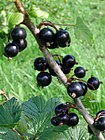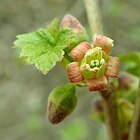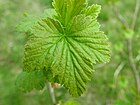Note: This is a project under development. The articles on this wiki are just being initiated and broadly incomplete. You can Help creating new pages.
Difference between revisions of "Ribes nigrum"
(Created page with "{{stub}} ==Uses== {{Uses|}}, {{Uses|}}, {{Uses|}}, {{Uses|}}, {{Uses|}}, {{Uses|}}, {{Uses|}}, {{Uses|}}, {{Uses|}}, {{Uses|}}, {{Uses|}}.<ref name="Uses"/> ==Parts Used== {{...") |
|||
| Line 1: | Line 1: | ||
| − | + | [[File:Zwarte bessen.jpg|thumb|right]] | |
| + | '''Ribes nigrum''' is an erect, deciduous shrub producing a cluster of stems 100 - 200cm tall. The blackcurrant is widely cultivated for its fruits in cooler parts of the temperate zone, especially in Europe and northern Asia. Its cultivation, though, is prohibited in parts of N. America because it harbours a stage of a rust that also affects many species of Pine. The plant also has a range of medicinal and other uses. | ||
==Uses== | ==Uses== | ||
| − | {{Uses|}}, {{Uses|}}, {{Uses|}}, {{Uses|}}, {{Uses|}}, {{Uses|}}, {{Uses|}}, {{Uses|}}, {{Uses|}}, {{Uses|}}, {{Uses|}}.<ref name="Uses"/> | + | {{Uses|Cold}}, {{Uses|Diarrhoea}}, {{Uses|Indigestion}}, {{Uses|Lower blood pressure}}, {{Uses|Rheumatic pain}}, {{Uses|Dropsy}}, {{Uses|Whooping cough}}, {{Uses|Ulcers}}, {{Uses|Eruptive fevers}}, {{Uses|Calculus}}, {{Uses|}}.<ref name="Uses"/> |
==Parts Used== | ==Parts Used== | ||
| − | {{Parts Used|}}, {{Parts Used| | + | {{Parts Used|Fruits}}, {{Parts Used|Leaves}}. |
==Chemical Composition== | ==Chemical Composition== | ||
| − | <ref name="chemical composition"/> | + | Black currant has been shown to be rich in phenolic compounds.16 In one study, black currant seed oil was found to contain 14.5% alpha-linolenic acid (18:3n3), 12.6% gamma-linolenic acid (18:3n6), 47.5% linoleic acid (18:2n6), and 2.7% stearidonic acid (18:4n3).1<ref name="chemical composition"/> |
==Common names== | ==Common names== | ||
| Line 16: | Line 17: | ||
===Dravya=== | ===Dravya=== | ||
===Rasa=== | ===Rasa=== | ||
| − | |||
===Guna=== | ===Guna=== | ||
| Line 29: | Line 29: | ||
==Habit== | ==Habit== | ||
| − | {{Habit|}} | + | {{Habit|Deciduous shrub}} |
==Identification== | ==Identification== | ||
| Line 48: | Line 48: | ||
==Mode of Propagation== | ==Mode of Propagation== | ||
| − | {{Propagation|}} | + | {{Propagation|Seeds}}, {{Propagation|Cuttings of half-ripe wood}}, {{Propagation|Cuttings of mature wood }}. |
==How to plant/cultivate== | ==How to plant/cultivate== | ||
| − | <ref name="How to plant/cultivate"/> | + | Ribes nirgrum is very cold hardy, when dormant it can tolerate temperatures falling to around -20°c, though flowers and young growth are damaged at around -1°c.<ref name="How to plant/cultivate"/> |
==Commonly seen growing in areas== | ==Commonly seen growing in areas== | ||
| − | {{Commonly seen|}}, {{Commonly seen|}}, {{Commonly seen|}}, {{Commonly seen| | + | {{Commonly seen|Hedges}}, {{Commonly seen|Woodlands}}, {{Commonly seen|Wet meadows}}, {{Commonly seen|Disturbed streamsides}}. |
==Photo Gallery== | ==Photo Gallery== | ||
<gallery class="left" caption="" widths="140px" heights="140px"> | <gallery class="left" caption="" widths="140px" heights="140px"> | ||
| − | + | Zwarte bessen.jpg | |
| + | Blackcurrant 1.jpg | ||
| + | Cassis à Grez-Doiceau 002.jpg | ||
| + | Johannisbeeren knospend.jpg | ||
| + | Ribes nigrum 2019-04-11 9539.jpg | ||
| + | Ribes nigrum 2019-04-11 9547.jpg | ||
</gallery> | </gallery> | ||
| Line 64: | Line 69: | ||
<references> | <references> | ||
| − | <ref name="chemical composition">[ | + | <ref name="chemical composition">[https://www.sigmaaldrich.com/life-science/nutrition-research/learning-center/plant-profiler/ribes-nigrum.html Chemical constituents]</ref> |
| − | <ref name="Leaf">[ | + | <ref name="Leaf">[Morphology]</ref> |
| − | <ref name="How to plant/cultivate">[ | + | <ref name="How to plant/cultivate">[http://temperate.theferns.info/plant/Ribes+nigrum Cultivation]</ref> |
<ref name="Uses">Indian Medicinal Plants by C.P.Khare</ref> | <ref name="Uses">Indian Medicinal Plants by C.P.Khare</ref> | ||
</references> | </references> | ||
==External Links== | ==External Links== | ||
| − | * [ ] | + | * [https://indiabiodiversity.org/species/show/245456 Ribes nigrum on indiabiodiversity.org] |
| − | * [ ] | + | * [https://www.sciencedirect.com/topics/agricultural-and-biological-sciences/ribes-nigrum Ribes nigrum on sciencedirect.com] |
| − | + | ||
[[Category:Herbs]] | [[Category:Herbs]] | ||
Latest revision as of 13:19, 31 July 2020
Ribes nigrum is an erect, deciduous shrub producing a cluster of stems 100 - 200cm tall. The blackcurrant is widely cultivated for its fruits in cooler parts of the temperate zone, especially in Europe and northern Asia. Its cultivation, though, is prohibited in parts of N. America because it harbours a stage of a rust that also affects many species of Pine. The plant also has a range of medicinal and other uses.
Contents
- 1 Uses
- 2 Parts Used
- 3 Chemical Composition
- 4 Common names
- 5 Properties
- 6 Habit
- 7 Identification
- 8 List of Ayurvedic medicine in which the herb is used
- 9 Where to get the saplings
- 10 Mode of Propagation
- 11 How to plant/cultivate
- 12 Commonly seen growing in areas
- 13 Photo Gallery
- 14 References
- 15 External Links
Uses
Cold, Diarrhoea, Indigestion, Lower blood pressure, Rheumatic pain, Dropsy, Whooping cough, Ulcers, Eruptive fevers, Calculus, [[:Category:Ayurvedic Herbs known to be helpful to treat |]].[1]
Parts Used
Chemical Composition
Black currant has been shown to be rich in phenolic compounds.16 In one study, black currant seed oil was found to contain 14.5% alpha-linolenic acid (18:3n3), 12.6% gamma-linolenic acid (18:3n6), 47.5% linoleic acid (18:2n6), and 2.7% stearidonic acid (18:4n3).1[2]
Common names
| Language | Common name |
|---|---|
| Kannada | |
| Hindi | |
| Malayalam | |
| Tamil | |
| Telugu | |
| Marathi | |
| Gujarathi | |
| Punjabi | |
| Kashmiri | |
| Sanskrit | |
| English |
Properties
Reference: Dravya - Substance, Rasa - Taste, Guna - Qualities, Veerya - Potency, Vipaka - Post-digesion effect, Karma - Pharmacological activity, Prabhava - Therepeutics.
Dravya
Rasa
Guna
Veerya
Vipaka
Karma
Prabhava
Habit
Identification
Leaf
| Kind | Shape | Feature |
|---|---|---|
Flower
| Type | Size | Color and composition | Stamen | More information |
|---|---|---|---|---|
| {{{5}}} |
Fruit
| Type | Size | Mass | Appearance | Seeds | More information |
|---|---|---|---|---|---|
Other features
List of Ayurvedic medicine in which the herb is used
Where to get the saplings
Mode of Propagation
Seeds, Cuttings of half-ripe wood, Cuttings of mature wood .
How to plant/cultivate
Ribes nirgrum is very cold hardy, when dormant it can tolerate temperatures falling to around -20°c, though flowers and young growth are damaged at around -1°c.[4]
Commonly seen growing in areas
Hedges, Woodlands, Wet meadows, Disturbed streamsides.
Photo Gallery
References
- ↑ Indian Medicinal Plants by C.P.Khare
- ↑ Chemical constituents
- ↑ [Morphology]
- ↑ Cultivation
External Links
- Ayurvedic Herbs known to be helpful to treat Cold
- Ayurvedic Herbs known to be helpful to treat Diarrhoea
- Ayurvedic Herbs known to be helpful to treat Indigestion
- Ayurvedic Herbs known to be helpful to treat Lower blood pressure
- Ayurvedic Herbs known to be helpful to treat Rheumatic pain
- Ayurvedic Herbs known to be helpful to treat Dropsy
- Ayurvedic Herbs known to be helpful to treat Whooping cough
- Ayurvedic Herbs known to be helpful to treat Ulcers
- Ayurvedic Herbs known to be helpful to treat Eruptive fevers
- Ayurvedic Herbs known to be helpful to treat Calculus
- Ayurvedic Herbs known to be helpful to treat
- Herbs with Fruits used in medicine
- Herbs with Leaves used in medicine
- Habit - Deciduous shrub
- Index of Plants which can be propagated by Seeds
- Index of Plants which can be propagated by Cuttings of half-ripe wood
- Index of Plants which can be propagated by Cuttings of mature wood
- Herbs that are commonly seen in the region of Hedges
- Herbs that are commonly seen in the region of Woodlands
- Herbs that are commonly seen in the region of Wet meadows
- Herbs that are commonly seen in the region of Disturbed streamsides
- Herbs






